Business Ethics: Stakeholders, CSR, and Ethical Operations
VerifiedAdded on 2022/11/17
|15
|4507
|1
Report
AI Summary
This report comprehensively explores the multifaceted domain of business ethics, encompassing the evolution of ethical approaches, and a comparative analysis of absolute and relative ethics. It identifies critical ethical issues impacting business operations, such as child labor, diversity, decision-making, integrity, and compliance. The report evaluates the implications of ethical operations for businesses and their stakeholders, including the case study of H&M, and analyzes potential conflicts among stakeholders like shareholders, managers, employees, and consumers. It further examines the impact of Corporate Social Responsibility (CSR) on supply chains, emphasizing the importance of mapping and ethical practices within them. The report also suggests strategies for improving ethics in business operations, outlining steps like establishing clear codes of conduct and ethical values. Finally, it addresses current ethical issues, the influence of CSR changes on business performance, and proposes recommendations for CSR policy improvements. The report concludes with a summary of the key findings and references.

RUNNING HEAD: ETHICS IN BUSINESS 0
Ethics in business
Student’s Details-
Ethics in business
Student’s Details-
Paraphrase This Document
Need a fresh take? Get an instant paraphrase of this document with our AI Paraphraser
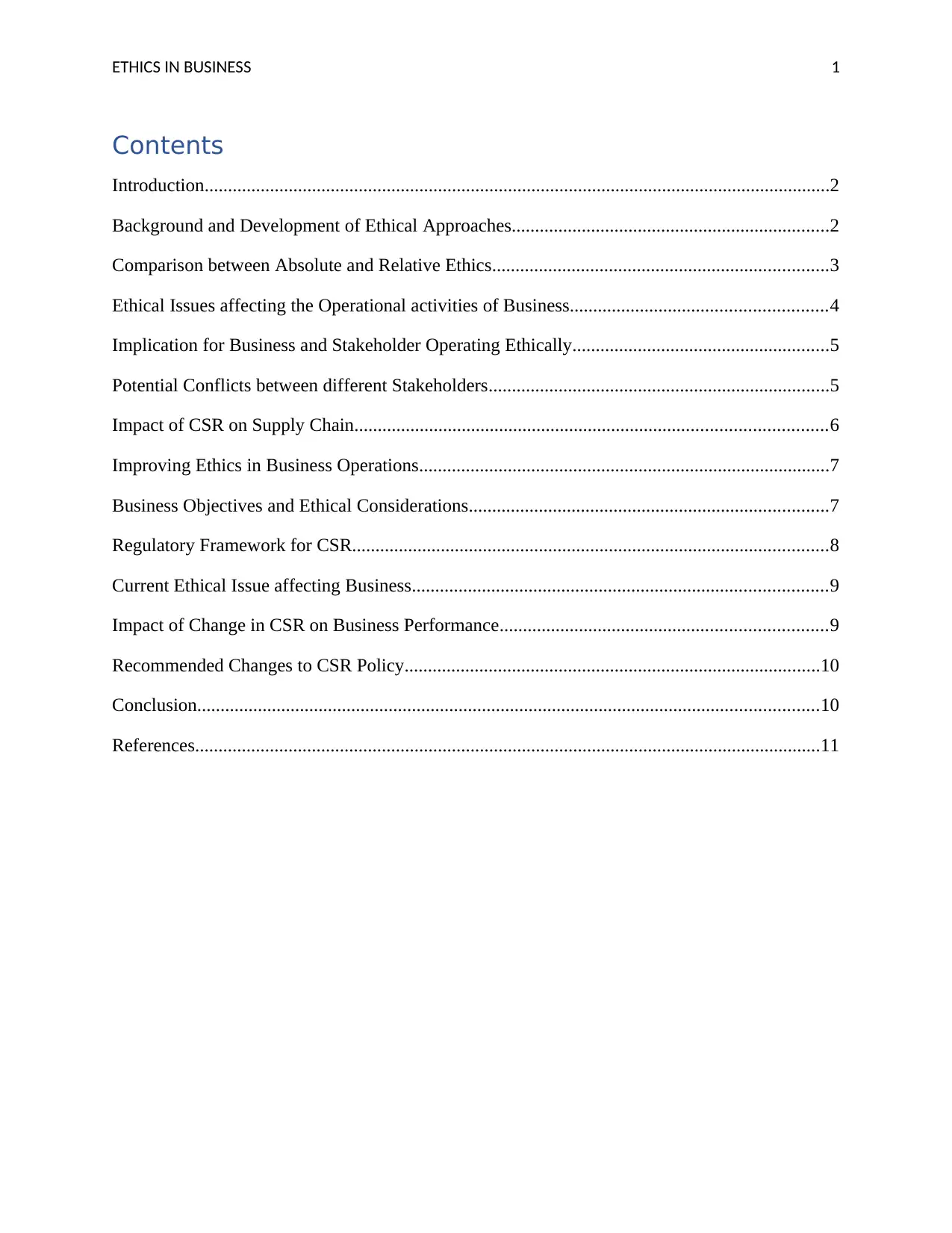
ETHICS IN BUSINESS 1
Contents
Introduction......................................................................................................................................2
Background and Development of Ethical Approaches....................................................................2
Comparison between Absolute and Relative Ethics........................................................................3
Ethical Issues affecting the Operational activities of Business.......................................................4
Implication for Business and Stakeholder Operating Ethically.......................................................5
Potential Conflicts between different Stakeholders.........................................................................5
Impact of CSR on Supply Chain.....................................................................................................6
Improving Ethics in Business Operations........................................................................................7
Business Objectives and Ethical Considerations.............................................................................7
Regulatory Framework for CSR......................................................................................................8
Current Ethical Issue affecting Business.........................................................................................9
Impact of Change in CSR on Business Performance......................................................................9
Recommended Changes to CSR Policy.........................................................................................10
Conclusion.....................................................................................................................................10
References......................................................................................................................................11
Contents
Introduction......................................................................................................................................2
Background and Development of Ethical Approaches....................................................................2
Comparison between Absolute and Relative Ethics........................................................................3
Ethical Issues affecting the Operational activities of Business.......................................................4
Implication for Business and Stakeholder Operating Ethically.......................................................5
Potential Conflicts between different Stakeholders.........................................................................5
Impact of CSR on Supply Chain.....................................................................................................6
Improving Ethics in Business Operations........................................................................................7
Business Objectives and Ethical Considerations.............................................................................7
Regulatory Framework for CSR......................................................................................................8
Current Ethical Issue affecting Business.........................................................................................9
Impact of Change in CSR on Business Performance......................................................................9
Recommended Changes to CSR Policy.........................................................................................10
Conclusion.....................................................................................................................................10
References......................................................................................................................................11
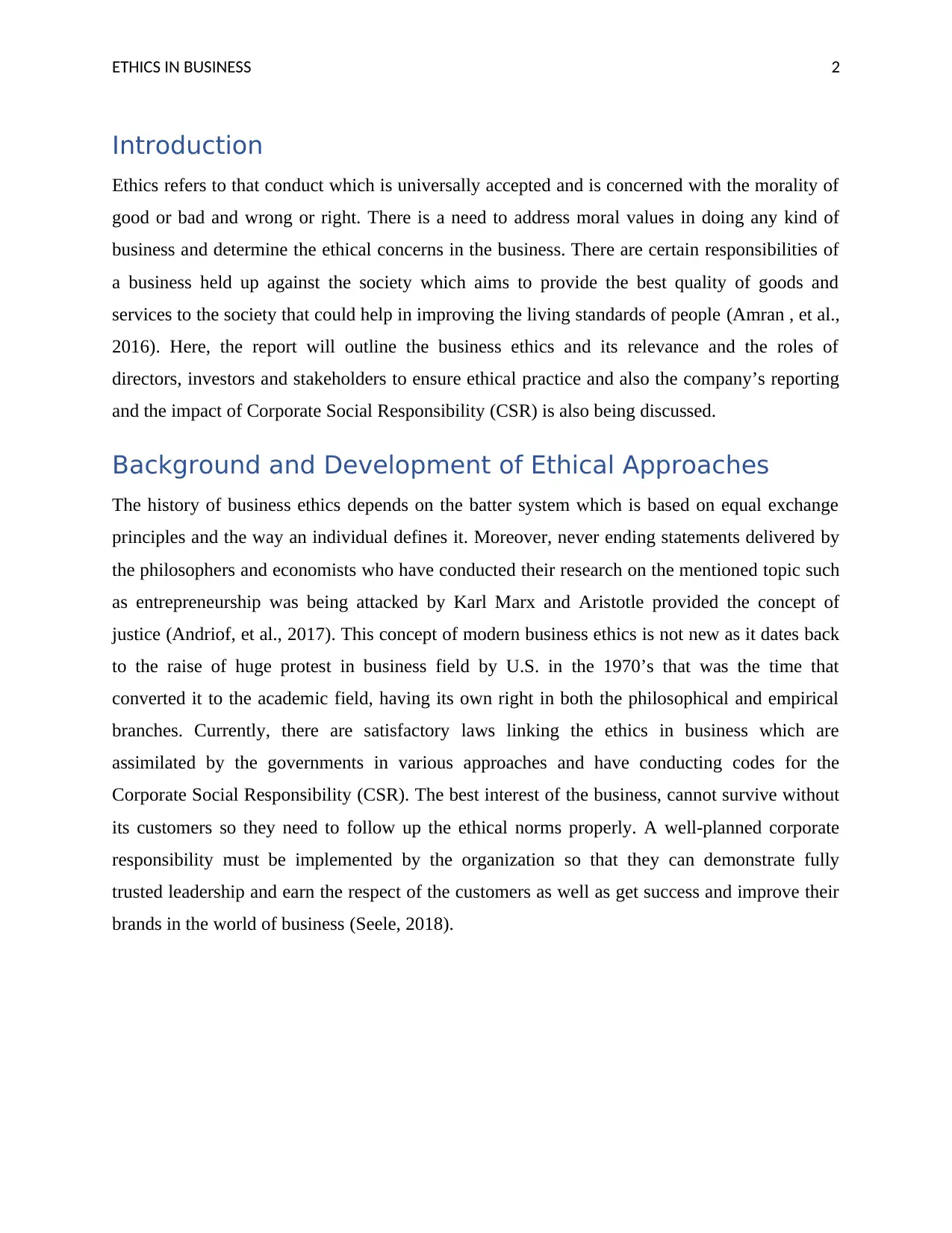
ETHICS IN BUSINESS 2
Introduction
Ethics refers to that conduct which is universally accepted and is concerned with the morality of
good or bad and wrong or right. There is a need to address moral values in doing any kind of
business and determine the ethical concerns in the business. There are certain responsibilities of
a business held up against the society which aims to provide the best quality of goods and
services to the society that could help in improving the living standards of people (Amran , et al.,
2016). Here, the report will outline the business ethics and its relevance and the roles of
directors, investors and stakeholders to ensure ethical practice and also the company’s reporting
and the impact of Corporate Social Responsibility (CSR) is also being discussed.
Background and Development of Ethical Approaches
The history of business ethics depends on the batter system which is based on equal exchange
principles and the way an individual defines it. Moreover, never ending statements delivered by
the philosophers and economists who have conducted their research on the mentioned topic such
as entrepreneurship was being attacked by Karl Marx and Aristotle provided the concept of
justice (Andriof, et al., 2017). This concept of modern business ethics is not new as it dates back
to the raise of huge protest in business field by U.S. in the 1970’s that was the time that
converted it to the academic field, having its own right in both the philosophical and empirical
branches. Currently, there are satisfactory laws linking the ethics in business which are
assimilated by the governments in various approaches and have conducting codes for the
Corporate Social Responsibility (CSR). The best interest of the business, cannot survive without
its customers so they need to follow up the ethical norms properly. A well-planned corporate
responsibility must be implemented by the organization so that they can demonstrate fully
trusted leadership and earn the respect of the customers as well as get success and improve their
brands in the world of business (Seele, 2018).
Introduction
Ethics refers to that conduct which is universally accepted and is concerned with the morality of
good or bad and wrong or right. There is a need to address moral values in doing any kind of
business and determine the ethical concerns in the business. There are certain responsibilities of
a business held up against the society which aims to provide the best quality of goods and
services to the society that could help in improving the living standards of people (Amran , et al.,
2016). Here, the report will outline the business ethics and its relevance and the roles of
directors, investors and stakeholders to ensure ethical practice and also the company’s reporting
and the impact of Corporate Social Responsibility (CSR) is also being discussed.
Background and Development of Ethical Approaches
The history of business ethics depends on the batter system which is based on equal exchange
principles and the way an individual defines it. Moreover, never ending statements delivered by
the philosophers and economists who have conducted their research on the mentioned topic such
as entrepreneurship was being attacked by Karl Marx and Aristotle provided the concept of
justice (Andriof, et al., 2017). This concept of modern business ethics is not new as it dates back
to the raise of huge protest in business field by U.S. in the 1970’s that was the time that
converted it to the academic field, having its own right in both the philosophical and empirical
branches. Currently, there are satisfactory laws linking the ethics in business which are
assimilated by the governments in various approaches and have conducting codes for the
Corporate Social Responsibility (CSR). The best interest of the business, cannot survive without
its customers so they need to follow up the ethical norms properly. A well-planned corporate
responsibility must be implemented by the organization so that they can demonstrate fully
trusted leadership and earn the respect of the customers as well as get success and improve their
brands in the world of business (Seele, 2018).
⊘ This is a preview!⊘
Do you want full access?
Subscribe today to unlock all pages.

Trusted by 1+ million students worldwide
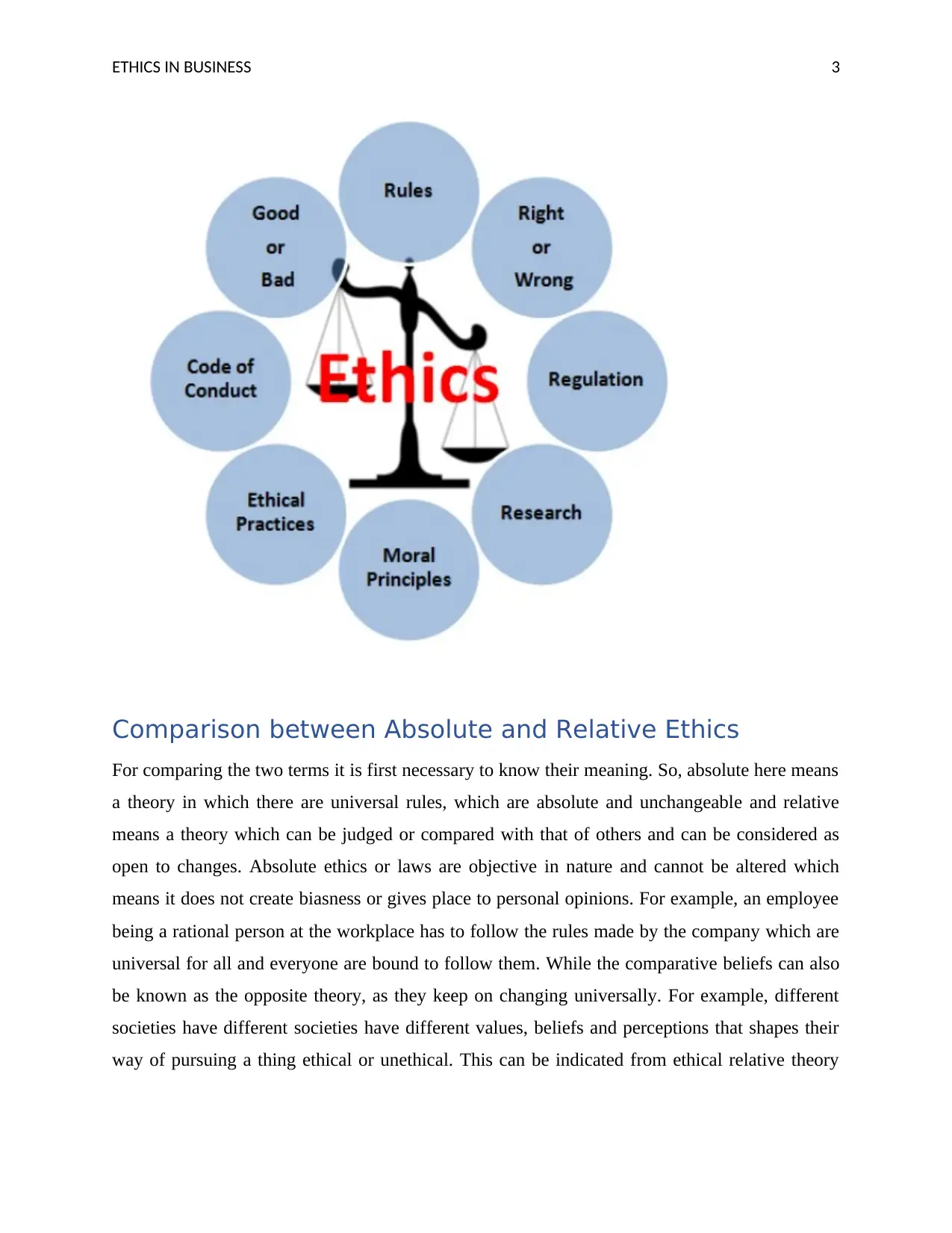
ETHICS IN BUSINESS 3
Comparison between Absolute and Relative Ethics
For comparing the two terms it is first necessary to know their meaning. So, absolute here means
a theory in which there are universal rules, which are absolute and unchangeable and relative
means a theory which can be judged or compared with that of others and can be considered as
open to changes. Absolute ethics or laws are objective in nature and cannot be altered which
means it does not create biasness or gives place to personal opinions. For example, an employee
being a rational person at the workplace has to follow the rules made by the company which are
universal for all and everyone are bound to follow them. While the comparative beliefs can also
be known as the opposite theory, as they keep on changing universally. For example, different
societies have different societies have different values, beliefs and perceptions that shapes their
way of pursuing a thing ethical or unethical. This can be indicated from ethical relative theory
Comparison between Absolute and Relative Ethics
For comparing the two terms it is first necessary to know their meaning. So, absolute here means
a theory in which there are universal rules, which are absolute and unchangeable and relative
means a theory which can be judged or compared with that of others and can be considered as
open to changes. Absolute ethics or laws are objective in nature and cannot be altered which
means it does not create biasness or gives place to personal opinions. For example, an employee
being a rational person at the workplace has to follow the rules made by the company which are
universal for all and everyone are bound to follow them. While the comparative beliefs can also
be known as the opposite theory, as they keep on changing universally. For example, different
societies have different societies have different values, beliefs and perceptions that shapes their
way of pursuing a thing ethical or unethical. This can be indicated from ethical relative theory
Paraphrase This Document
Need a fresh take? Get an instant paraphrase of this document with our AI Paraphraser
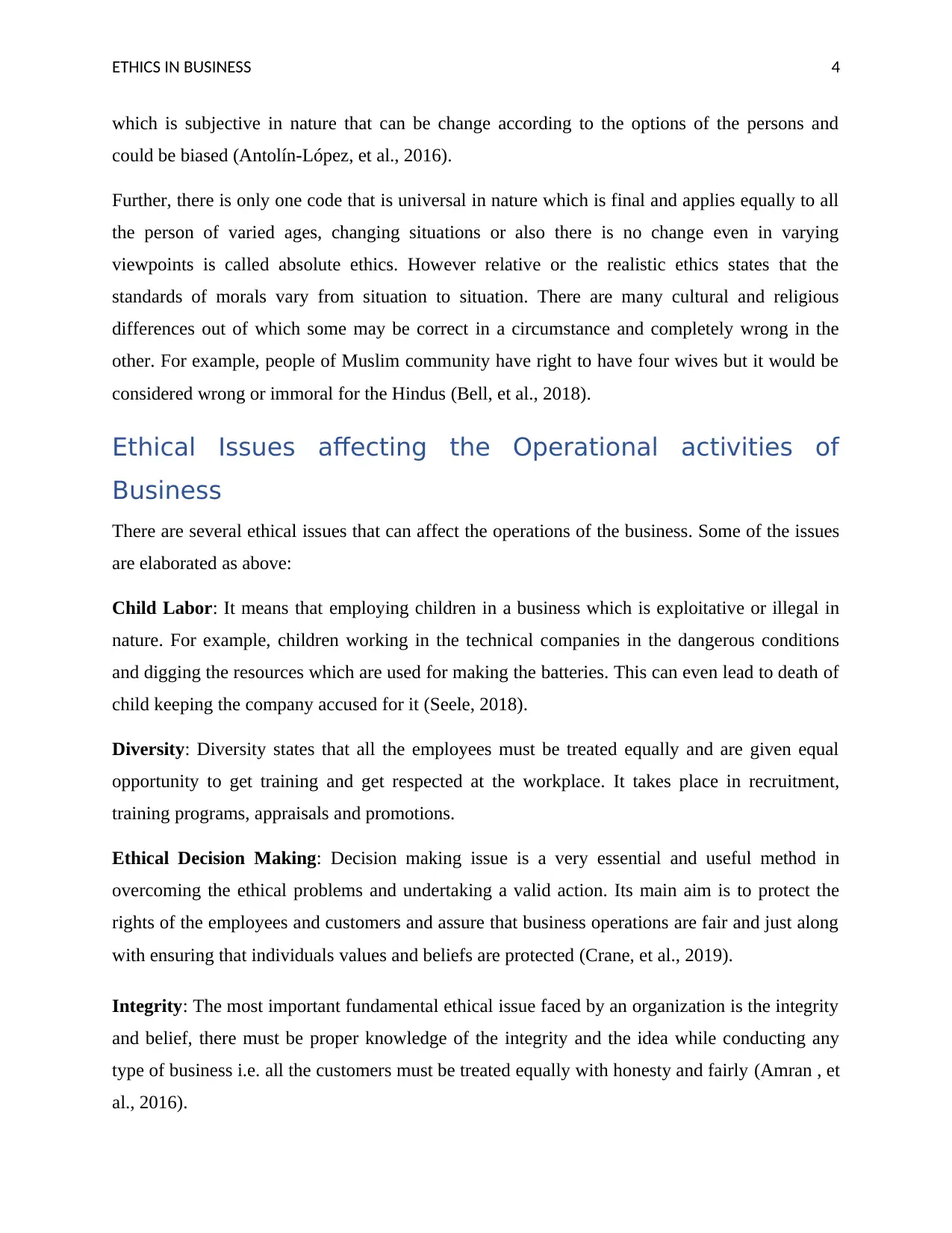
ETHICS IN BUSINESS 4
which is subjective in nature that can be change according to the options of the persons and
could be biased (Antolín-López, et al., 2016).
Further, there is only one code that is universal in nature which is final and applies equally to all
the person of varied ages, changing situations or also there is no change even in varying
viewpoints is called absolute ethics. However relative or the realistic ethics states that the
standards of morals vary from situation to situation. There are many cultural and religious
differences out of which some may be correct in a circumstance and completely wrong in the
other. For example, people of Muslim community have right to have four wives but it would be
considered wrong or immoral for the Hindus (Bell, et al., 2018).
Ethical Issues affecting the Operational activities of
Business
There are several ethical issues that can affect the operations of the business. Some of the issues
are elaborated as above:
Child Labor: It means that employing children in a business which is exploitative or illegal in
nature. For example, children working in the technical companies in the dangerous conditions
and digging the resources which are used for making the batteries. This can even lead to death of
child keeping the company accused for it (Seele, 2018).
Diversity: Diversity states that all the employees must be treated equally and are given equal
opportunity to get training and get respected at the workplace. It takes place in recruitment,
training programs, appraisals and promotions.
Ethical Decision Making: Decision making issue is a very essential and useful method in
overcoming the ethical problems and undertaking a valid action. Its main aim is to protect the
rights of the employees and customers and assure that business operations are fair and just along
with ensuring that individuals values and beliefs are protected (Crane, et al., 2019).
Integrity: The most important fundamental ethical issue faced by an organization is the integrity
and belief, there must be proper knowledge of the integrity and the idea while conducting any
type of business i.e. all the customers must be treated equally with honesty and fairly (Amran , et
al., 2016).
which is subjective in nature that can be change according to the options of the persons and
could be biased (Antolín-López, et al., 2016).
Further, there is only one code that is universal in nature which is final and applies equally to all
the person of varied ages, changing situations or also there is no change even in varying
viewpoints is called absolute ethics. However relative or the realistic ethics states that the
standards of morals vary from situation to situation. There are many cultural and religious
differences out of which some may be correct in a circumstance and completely wrong in the
other. For example, people of Muslim community have right to have four wives but it would be
considered wrong or immoral for the Hindus (Bell, et al., 2018).
Ethical Issues affecting the Operational activities of
Business
There are several ethical issues that can affect the operations of the business. Some of the issues
are elaborated as above:
Child Labor: It means that employing children in a business which is exploitative or illegal in
nature. For example, children working in the technical companies in the dangerous conditions
and digging the resources which are used for making the batteries. This can even lead to death of
child keeping the company accused for it (Seele, 2018).
Diversity: Diversity states that all the employees must be treated equally and are given equal
opportunity to get training and get respected at the workplace. It takes place in recruitment,
training programs, appraisals and promotions.
Ethical Decision Making: Decision making issue is a very essential and useful method in
overcoming the ethical problems and undertaking a valid action. Its main aim is to protect the
rights of the employees and customers and assure that business operations are fair and just along
with ensuring that individuals values and beliefs are protected (Crane, et al., 2019).
Integrity: The most important fundamental ethical issue faced by an organization is the integrity
and belief, there must be proper knowledge of the integrity and the idea while conducting any
type of business i.e. all the customers must be treated equally with honesty and fairly (Amran , et
al., 2016).
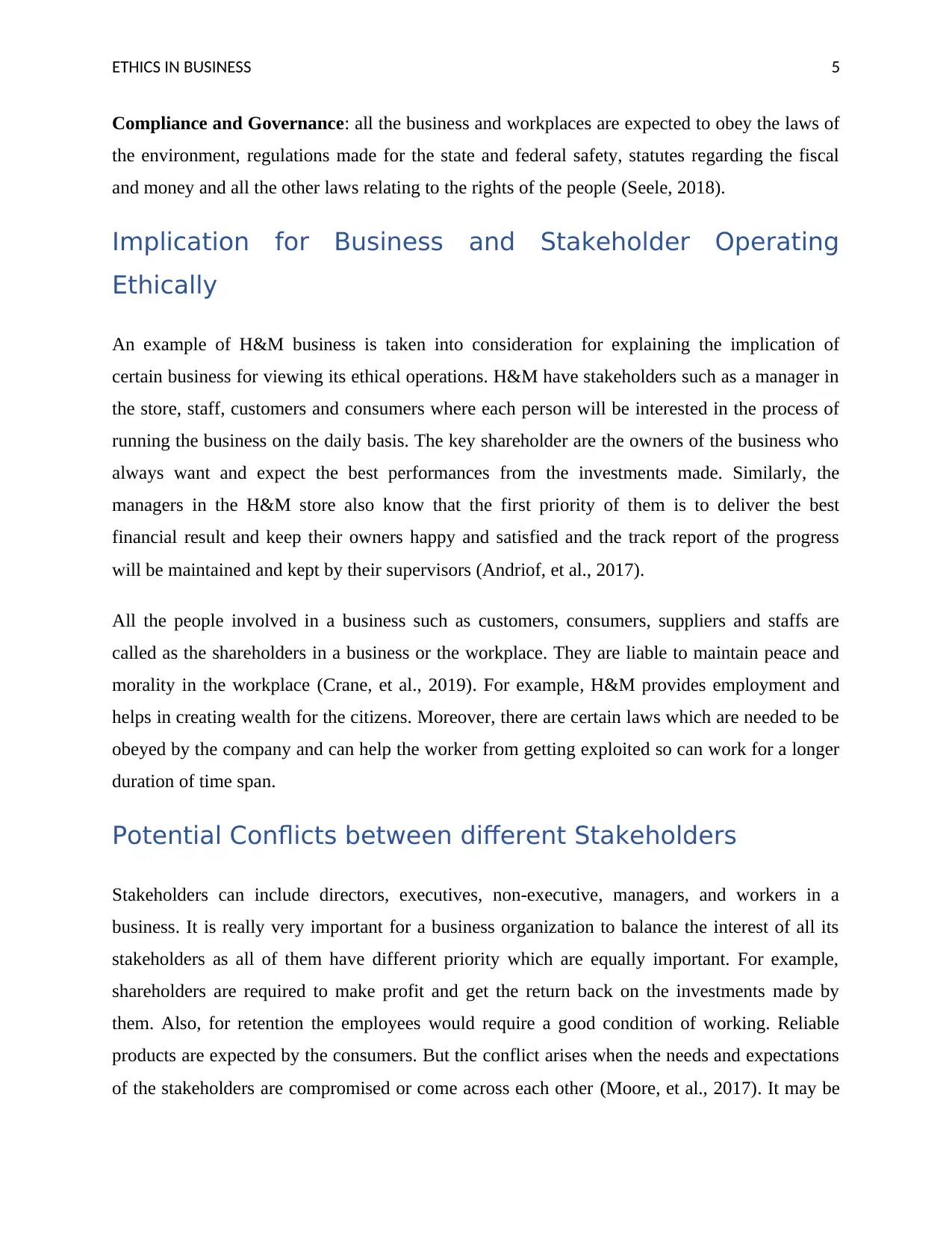
ETHICS IN BUSINESS 5
Compliance and Governance: all the business and workplaces are expected to obey the laws of
the environment, regulations made for the state and federal safety, statutes regarding the fiscal
and money and all the other laws relating to the rights of the people (Seele, 2018).
Implication for Business and Stakeholder Operating
Ethically
An example of H&M business is taken into consideration for explaining the implication of
certain business for viewing its ethical operations. H&M have stakeholders such as a manager in
the store, staff, customers and consumers where each person will be interested in the process of
running the business on the daily basis. The key shareholder are the owners of the business who
always want and expect the best performances from the investments made. Similarly, the
managers in the H&M store also know that the first priority of them is to deliver the best
financial result and keep their owners happy and satisfied and the track report of the progress
will be maintained and kept by their supervisors (Andriof, et al., 2017).
All the people involved in a business such as customers, consumers, suppliers and staffs are
called as the shareholders in a business or the workplace. They are liable to maintain peace and
morality in the workplace (Crane, et al., 2019). For example, H&M provides employment and
helps in creating wealth for the citizens. Moreover, there are certain laws which are needed to be
obeyed by the company and can help the worker from getting exploited so can work for a longer
duration of time span.
Potential Conflicts between different Stakeholders
Stakeholders can include directors, executives, non-executive, managers, and workers in a
business. It is really very important for a business organization to balance the interest of all its
stakeholders as all of them have different priority which are equally important. For example,
shareholders are required to make profit and get the return back on the investments made by
them. Also, for retention the employees would require a good condition of working. Reliable
products are expected by the consumers. But the conflict arises when the needs and expectations
of the stakeholders are compromised or come across each other (Moore, et al., 2017). It may be
Compliance and Governance: all the business and workplaces are expected to obey the laws of
the environment, regulations made for the state and federal safety, statutes regarding the fiscal
and money and all the other laws relating to the rights of the people (Seele, 2018).
Implication for Business and Stakeholder Operating
Ethically
An example of H&M business is taken into consideration for explaining the implication of
certain business for viewing its ethical operations. H&M have stakeholders such as a manager in
the store, staff, customers and consumers where each person will be interested in the process of
running the business on the daily basis. The key shareholder are the owners of the business who
always want and expect the best performances from the investments made. Similarly, the
managers in the H&M store also know that the first priority of them is to deliver the best
financial result and keep their owners happy and satisfied and the track report of the progress
will be maintained and kept by their supervisors (Andriof, et al., 2017).
All the people involved in a business such as customers, consumers, suppliers and staffs are
called as the shareholders in a business or the workplace. They are liable to maintain peace and
morality in the workplace (Crane, et al., 2019). For example, H&M provides employment and
helps in creating wealth for the citizens. Moreover, there are certain laws which are needed to be
obeyed by the company and can help the worker from getting exploited so can work for a longer
duration of time span.
Potential Conflicts between different Stakeholders
Stakeholders can include directors, executives, non-executive, managers, and workers in a
business. It is really very important for a business organization to balance the interest of all its
stakeholders as all of them have different priority which are equally important. For example,
shareholders are required to make profit and get the return back on the investments made by
them. Also, for retention the employees would require a good condition of working. Reliable
products are expected by the consumers. But the conflict arises when the needs and expectations
of the stakeholders are compromised or come across each other (Moore, et al., 2017). It may be
⊘ This is a preview!⊘
Do you want full access?
Subscribe today to unlock all pages.

Trusted by 1+ million students worldwide
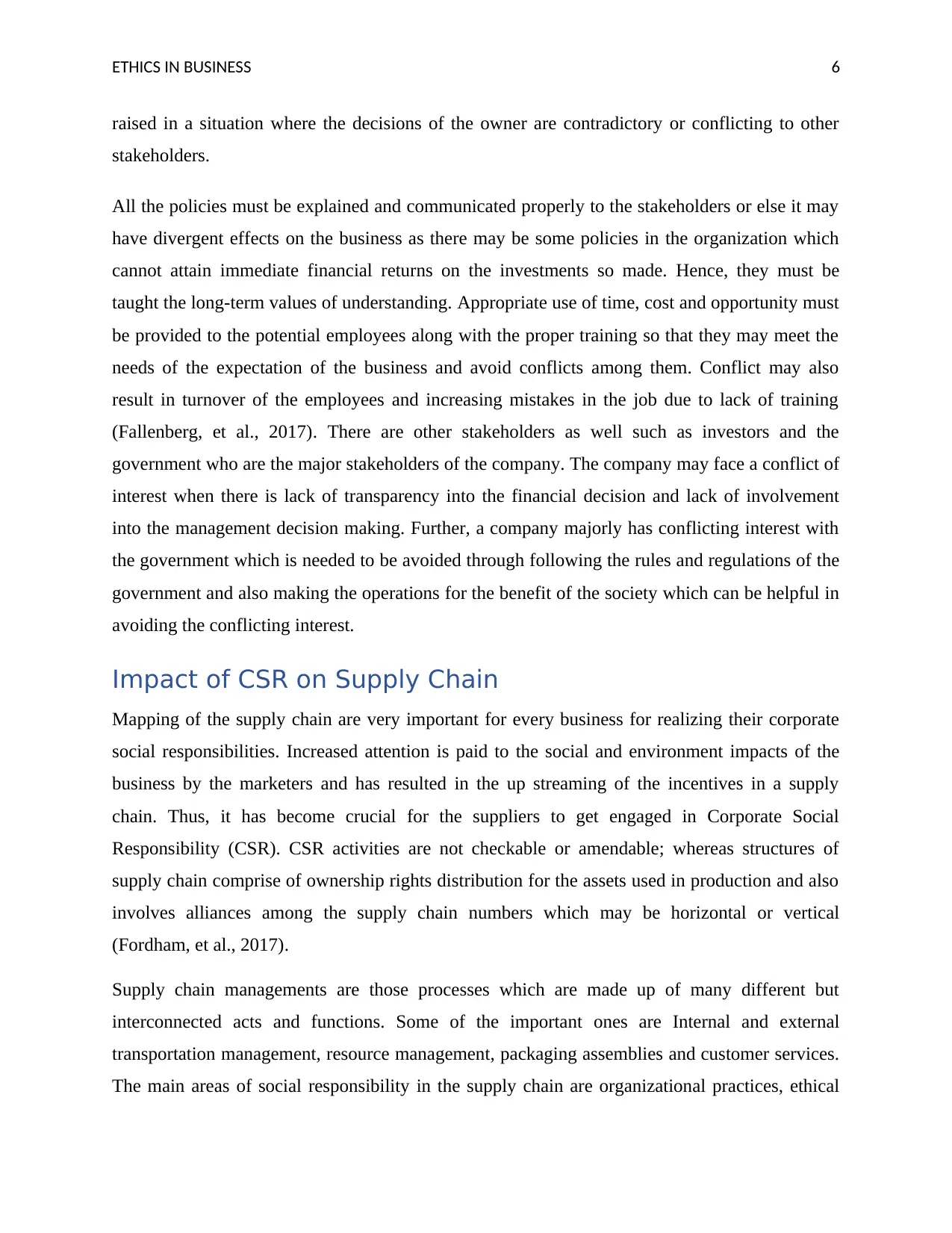
ETHICS IN BUSINESS 6
raised in a situation where the decisions of the owner are contradictory or conflicting to other
stakeholders.
All the policies must be explained and communicated properly to the stakeholders or else it may
have divergent effects on the business as there may be some policies in the organization which
cannot attain immediate financial returns on the investments so made. Hence, they must be
taught the long-term values of understanding. Appropriate use of time, cost and opportunity must
be provided to the potential employees along with the proper training so that they may meet the
needs of the expectation of the business and avoid conflicts among them. Conflict may also
result in turnover of the employees and increasing mistakes in the job due to lack of training
(Fallenberg, et al., 2017). There are other stakeholders as well such as investors and the
government who are the major stakeholders of the company. The company may face a conflict of
interest when there is lack of transparency into the financial decision and lack of involvement
into the management decision making. Further, a company majorly has conflicting interest with
the government which is needed to be avoided through following the rules and regulations of the
government and also making the operations for the benefit of the society which can be helpful in
avoiding the conflicting interest.
Impact of CSR on Supply Chain
Mapping of the supply chain are very important for every business for realizing their corporate
social responsibilities. Increased attention is paid to the social and environment impacts of the
business by the marketers and has resulted in the up streaming of the incentives in a supply
chain. Thus, it has become crucial for the suppliers to get engaged in Corporate Social
Responsibility (CSR). CSR activities are not checkable or amendable; whereas structures of
supply chain comprise of ownership rights distribution for the assets used in production and also
involves alliances among the supply chain numbers which may be horizontal or vertical
(Fordham, et al., 2017).
Supply chain managements are those processes which are made up of many different but
interconnected acts and functions. Some of the important ones are Internal and external
transportation management, resource management, packaging assemblies and customer services.
The main areas of social responsibility in the supply chain are organizational practices, ethical
raised in a situation where the decisions of the owner are contradictory or conflicting to other
stakeholders.
All the policies must be explained and communicated properly to the stakeholders or else it may
have divergent effects on the business as there may be some policies in the organization which
cannot attain immediate financial returns on the investments so made. Hence, they must be
taught the long-term values of understanding. Appropriate use of time, cost and opportunity must
be provided to the potential employees along with the proper training so that they may meet the
needs of the expectation of the business and avoid conflicts among them. Conflict may also
result in turnover of the employees and increasing mistakes in the job due to lack of training
(Fallenberg, et al., 2017). There are other stakeholders as well such as investors and the
government who are the major stakeholders of the company. The company may face a conflict of
interest when there is lack of transparency into the financial decision and lack of involvement
into the management decision making. Further, a company majorly has conflicting interest with
the government which is needed to be avoided through following the rules and regulations of the
government and also making the operations for the benefit of the society which can be helpful in
avoiding the conflicting interest.
Impact of CSR on Supply Chain
Mapping of the supply chain are very important for every business for realizing their corporate
social responsibilities. Increased attention is paid to the social and environment impacts of the
business by the marketers and has resulted in the up streaming of the incentives in a supply
chain. Thus, it has become crucial for the suppliers to get engaged in Corporate Social
Responsibility (CSR). CSR activities are not checkable or amendable; whereas structures of
supply chain comprise of ownership rights distribution for the assets used in production and also
involves alliances among the supply chain numbers which may be horizontal or vertical
(Fordham, et al., 2017).
Supply chain managements are those processes which are made up of many different but
interconnected acts and functions. Some of the important ones are Internal and external
transportation management, resource management, packaging assemblies and customer services.
The main areas of social responsibility in the supply chain are organizational practices, ethical
Paraphrase This Document
Need a fresh take? Get an instant paraphrase of this document with our AI Paraphraser
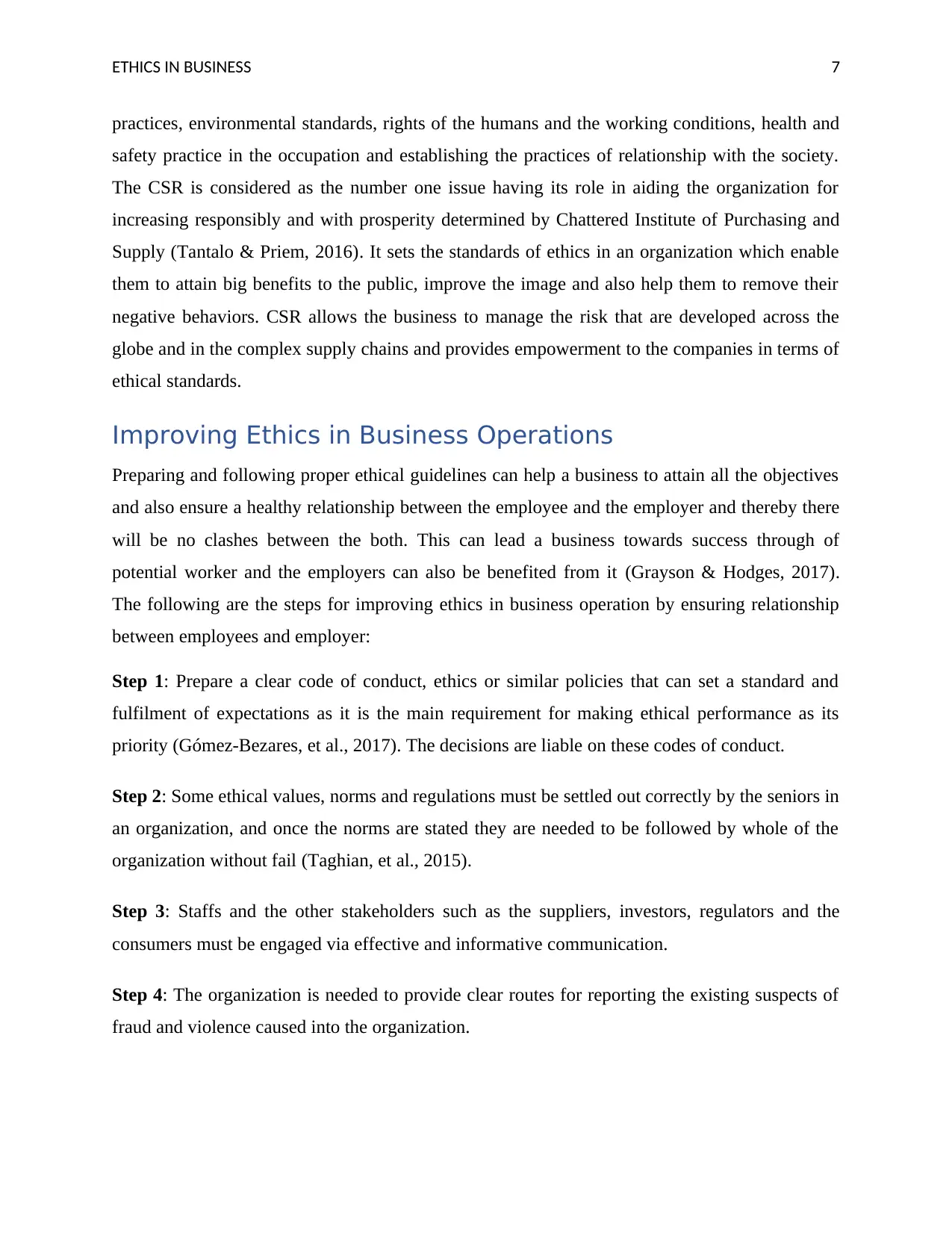
ETHICS IN BUSINESS 7
practices, environmental standards, rights of the humans and the working conditions, health and
safety practice in the occupation and establishing the practices of relationship with the society.
The CSR is considered as the number one issue having its role in aiding the organization for
increasing responsibly and with prosperity determined by Chattered Institute of Purchasing and
Supply (Tantalo & Priem, 2016). It sets the standards of ethics in an organization which enable
them to attain big benefits to the public, improve the image and also help them to remove their
negative behaviors. CSR allows the business to manage the risk that are developed across the
globe and in the complex supply chains and provides empowerment to the companies in terms of
ethical standards.
Improving Ethics in Business Operations
Preparing and following proper ethical guidelines can help a business to attain all the objectives
and also ensure a healthy relationship between the employee and the employer and thereby there
will be no clashes between the both. This can lead a business towards success through of
potential worker and the employers can also be benefited from it (Grayson & Hodges, 2017).
The following are the steps for improving ethics in business operation by ensuring relationship
between employees and employer:
Step 1: Prepare a clear code of conduct, ethics or similar policies that can set a standard and
fulfilment of expectations as it is the main requirement for making ethical performance as its
priority (Gómez‐Bezares, et al., 2017). The decisions are liable on these codes of conduct.
Step 2: Some ethical values, norms and regulations must be settled out correctly by the seniors in
an organization, and once the norms are stated they are needed to be followed by whole of the
organization without fail (Taghian, et al., 2015).
Step 3: Staffs and the other stakeholders such as the suppliers, investors, regulators and the
consumers must be engaged via effective and informative communication.
Step 4: The organization is needed to provide clear routes for reporting the existing suspects of
fraud and violence caused into the organization.
practices, environmental standards, rights of the humans and the working conditions, health and
safety practice in the occupation and establishing the practices of relationship with the society.
The CSR is considered as the number one issue having its role in aiding the organization for
increasing responsibly and with prosperity determined by Chattered Institute of Purchasing and
Supply (Tantalo & Priem, 2016). It sets the standards of ethics in an organization which enable
them to attain big benefits to the public, improve the image and also help them to remove their
negative behaviors. CSR allows the business to manage the risk that are developed across the
globe and in the complex supply chains and provides empowerment to the companies in terms of
ethical standards.
Improving Ethics in Business Operations
Preparing and following proper ethical guidelines can help a business to attain all the objectives
and also ensure a healthy relationship between the employee and the employer and thereby there
will be no clashes between the both. This can lead a business towards success through of
potential worker and the employers can also be benefited from it (Grayson & Hodges, 2017).
The following are the steps for improving ethics in business operation by ensuring relationship
between employees and employer:
Step 1: Prepare a clear code of conduct, ethics or similar policies that can set a standard and
fulfilment of expectations as it is the main requirement for making ethical performance as its
priority (Gómez‐Bezares, et al., 2017). The decisions are liable on these codes of conduct.
Step 2: Some ethical values, norms and regulations must be settled out correctly by the seniors in
an organization, and once the norms are stated they are needed to be followed by whole of the
organization without fail (Taghian, et al., 2015).
Step 3: Staffs and the other stakeholders such as the suppliers, investors, regulators and the
consumers must be engaged via effective and informative communication.
Step 4: The organization is needed to provide clear routes for reporting the existing suspects of
fraud and violence caused into the organization.
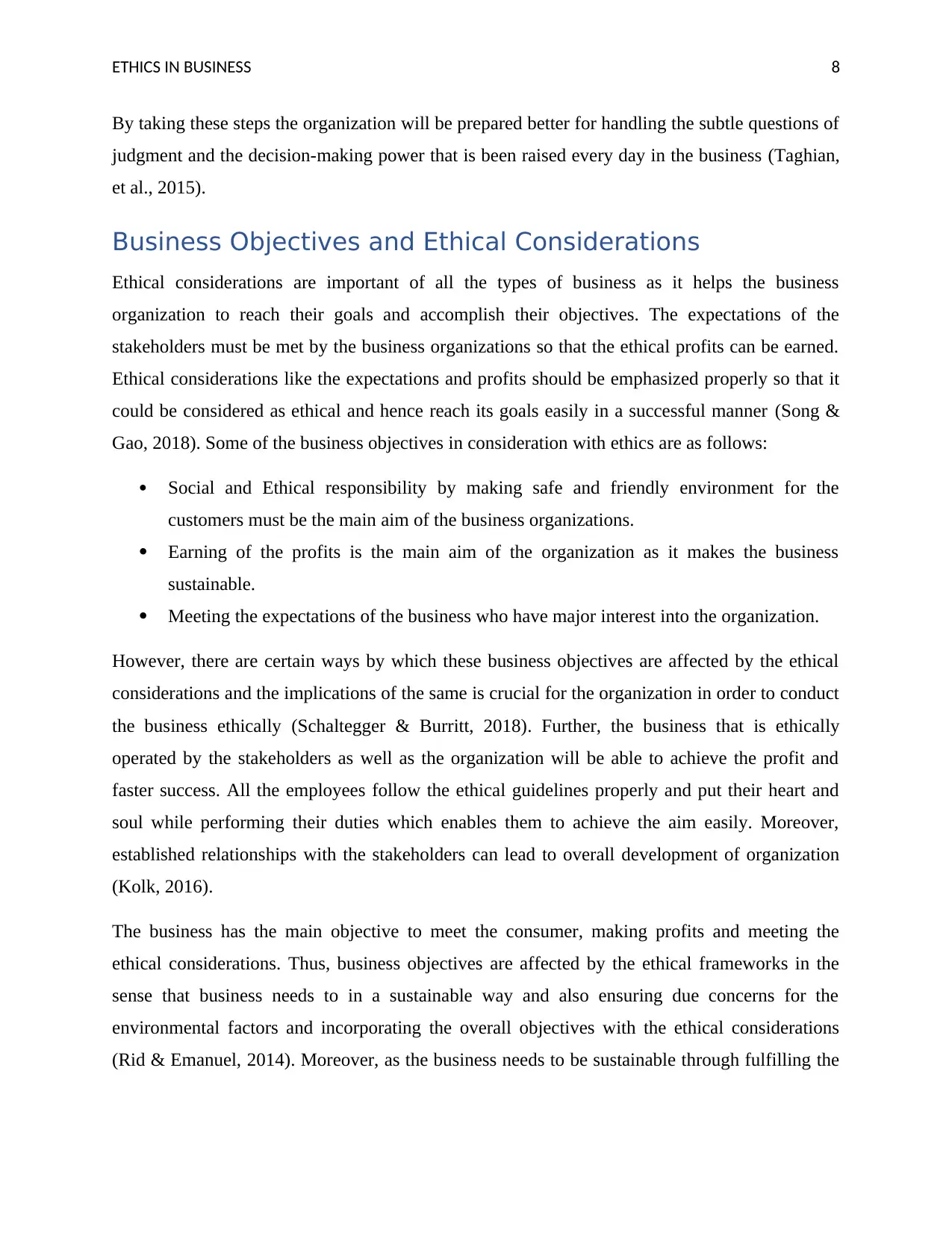
ETHICS IN BUSINESS 8
By taking these steps the organization will be prepared better for handling the subtle questions of
judgment and the decision-making power that is been raised every day in the business (Taghian,
et al., 2015).
Business Objectives and Ethical Considerations
Ethical considerations are important of all the types of business as it helps the business
organization to reach their goals and accomplish their objectives. The expectations of the
stakeholders must be met by the business organizations so that the ethical profits can be earned.
Ethical considerations like the expectations and profits should be emphasized properly so that it
could be considered as ethical and hence reach its goals easily in a successful manner (Song &
Gao, 2018). Some of the business objectives in consideration with ethics are as follows:
Social and Ethical responsibility by making safe and friendly environment for the
customers must be the main aim of the business organizations.
Earning of the profits is the main aim of the organization as it makes the business
sustainable.
Meeting the expectations of the business who have major interest into the organization.
However, there are certain ways by which these business objectives are affected by the ethical
considerations and the implications of the same is crucial for the organization in order to conduct
the business ethically (Schaltegger & Burritt, 2018). Further, the business that is ethically
operated by the stakeholders as well as the organization will be able to achieve the profit and
faster success. All the employees follow the ethical guidelines properly and put their heart and
soul while performing their duties which enables them to achieve the aim easily. Moreover,
established relationships with the stakeholders can lead to overall development of organization
(Kolk, 2016).
The business has the main objective to meet the consumer, making profits and meeting the
ethical considerations. Thus, business objectives are affected by the ethical frameworks in the
sense that business needs to in a sustainable way and also ensuring due concerns for the
environmental factors and incorporating the overall objectives with the ethical considerations
(Rid & Emanuel, 2014). Moreover, as the business needs to be sustainable through fulfilling the
By taking these steps the organization will be prepared better for handling the subtle questions of
judgment and the decision-making power that is been raised every day in the business (Taghian,
et al., 2015).
Business Objectives and Ethical Considerations
Ethical considerations are important of all the types of business as it helps the business
organization to reach their goals and accomplish their objectives. The expectations of the
stakeholders must be met by the business organizations so that the ethical profits can be earned.
Ethical considerations like the expectations and profits should be emphasized properly so that it
could be considered as ethical and hence reach its goals easily in a successful manner (Song &
Gao, 2018). Some of the business objectives in consideration with ethics are as follows:
Social and Ethical responsibility by making safe and friendly environment for the
customers must be the main aim of the business organizations.
Earning of the profits is the main aim of the organization as it makes the business
sustainable.
Meeting the expectations of the business who have major interest into the organization.
However, there are certain ways by which these business objectives are affected by the ethical
considerations and the implications of the same is crucial for the organization in order to conduct
the business ethically (Schaltegger & Burritt, 2018). Further, the business that is ethically
operated by the stakeholders as well as the organization will be able to achieve the profit and
faster success. All the employees follow the ethical guidelines properly and put their heart and
soul while performing their duties which enables them to achieve the aim easily. Moreover,
established relationships with the stakeholders can lead to overall development of organization
(Kolk, 2016).
The business has the main objective to meet the consumer, making profits and meeting the
ethical considerations. Thus, business objectives are affected by the ethical frameworks in the
sense that business needs to in a sustainable way and also ensuring due concerns for the
environmental factors and incorporating the overall objectives with the ethical considerations
(Rid & Emanuel, 2014). Moreover, as the business needs to be sustainable through fulfilling the
⊘ This is a preview!⊘
Do you want full access?
Subscribe today to unlock all pages.

Trusted by 1+ million students worldwide
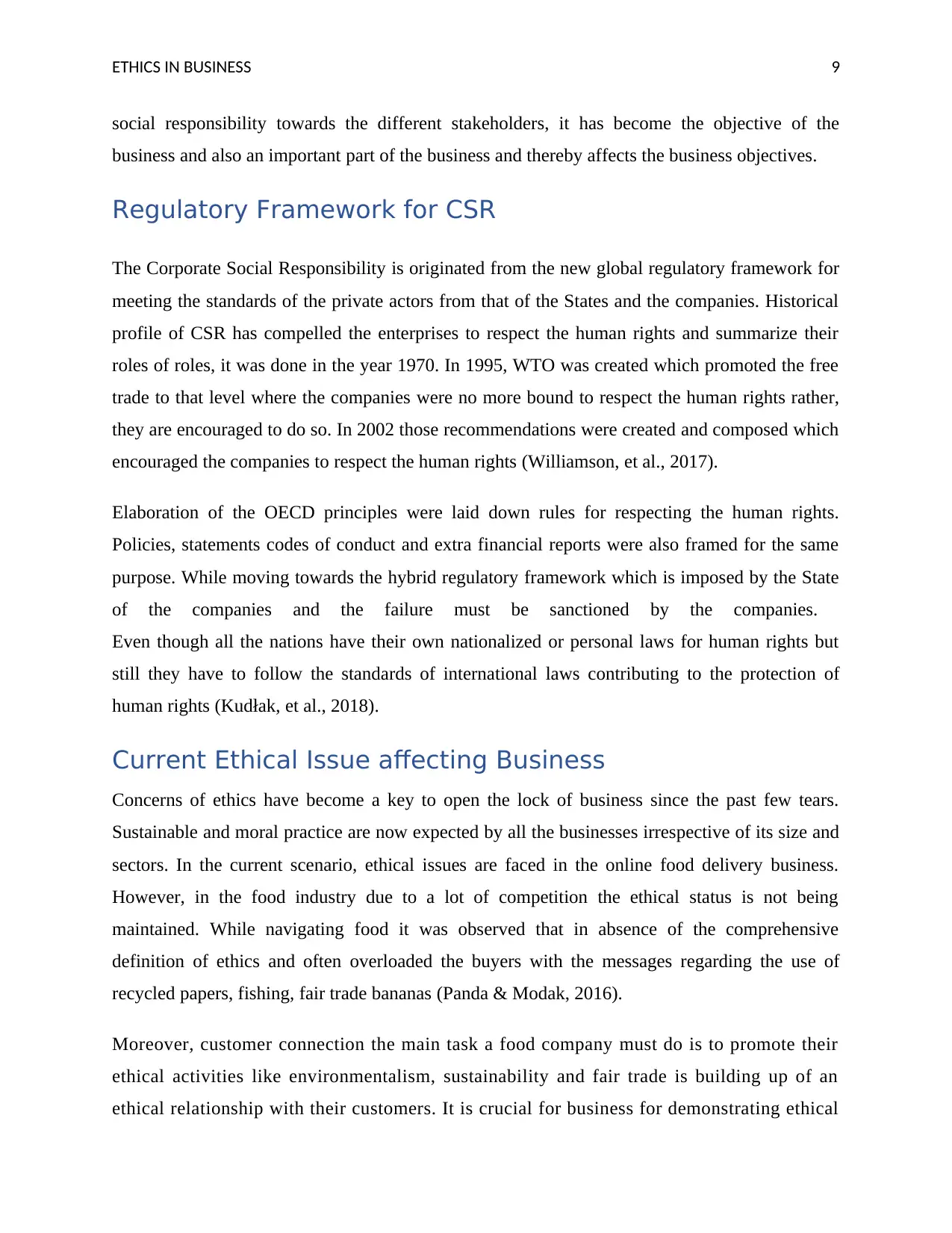
ETHICS IN BUSINESS 9
social responsibility towards the different stakeholders, it has become the objective of the
business and also an important part of the business and thereby affects the business objectives.
Regulatory Framework for CSR
The Corporate Social Responsibility is originated from the new global regulatory framework for
meeting the standards of the private actors from that of the States and the companies. Historical
profile of CSR has compelled the enterprises to respect the human rights and summarize their
roles of roles, it was done in the year 1970. In 1995, WTO was created which promoted the free
trade to that level where the companies were no more bound to respect the human rights rather,
they are encouraged to do so. In 2002 those recommendations were created and composed which
encouraged the companies to respect the human rights (Williamson, et al., 2017).
Elaboration of the OECD principles were laid down rules for respecting the human rights.
Policies, statements codes of conduct and extra financial reports were also framed for the same
purpose. While moving towards the hybrid regulatory framework which is imposed by the State
of the companies and the failure must be sanctioned by the companies.
Even though all the nations have their own nationalized or personal laws for human rights but
still they have to follow the standards of international laws contributing to the protection of
human rights (Kudłak, et al., 2018).
Current Ethical Issue affecting Business
Concerns of ethics have become a key to open the lock of business since the past few tears.
Sustainable and moral practice are now expected by all the businesses irrespective of its size and
sectors. In the current scenario, ethical issues are faced in the online food delivery business.
However, in the food industry due to a lot of competition the ethical status is not being
maintained. While navigating food it was observed that in absence of the comprehensive
definition of ethics and often overloaded the buyers with the messages regarding the use of
recycled papers, fishing, fair trade bananas (Panda & Modak, 2016).
Moreover, customer connection the main task a food company must do is to promote their
ethical activities like environmentalism, sustainability and fair trade is building up of an
ethical relationship with their customers. It is crucial for business for demonstrating ethical
social responsibility towards the different stakeholders, it has become the objective of the
business and also an important part of the business and thereby affects the business objectives.
Regulatory Framework for CSR
The Corporate Social Responsibility is originated from the new global regulatory framework for
meeting the standards of the private actors from that of the States and the companies. Historical
profile of CSR has compelled the enterprises to respect the human rights and summarize their
roles of roles, it was done in the year 1970. In 1995, WTO was created which promoted the free
trade to that level where the companies were no more bound to respect the human rights rather,
they are encouraged to do so. In 2002 those recommendations were created and composed which
encouraged the companies to respect the human rights (Williamson, et al., 2017).
Elaboration of the OECD principles were laid down rules for respecting the human rights.
Policies, statements codes of conduct and extra financial reports were also framed for the same
purpose. While moving towards the hybrid regulatory framework which is imposed by the State
of the companies and the failure must be sanctioned by the companies.
Even though all the nations have their own nationalized or personal laws for human rights but
still they have to follow the standards of international laws contributing to the protection of
human rights (Kudłak, et al., 2018).
Current Ethical Issue affecting Business
Concerns of ethics have become a key to open the lock of business since the past few tears.
Sustainable and moral practice are now expected by all the businesses irrespective of its size and
sectors. In the current scenario, ethical issues are faced in the online food delivery business.
However, in the food industry due to a lot of competition the ethical status is not being
maintained. While navigating food it was observed that in absence of the comprehensive
definition of ethics and often overloaded the buyers with the messages regarding the use of
recycled papers, fishing, fair trade bananas (Panda & Modak, 2016).
Moreover, customer connection the main task a food company must do is to promote their
ethical activities like environmentalism, sustainability and fair trade is building up of an
ethical relationship with their customers. It is crucial for business for demonstrating ethical
Paraphrase This Document
Need a fresh take? Get an instant paraphrase of this document with our AI Paraphraser
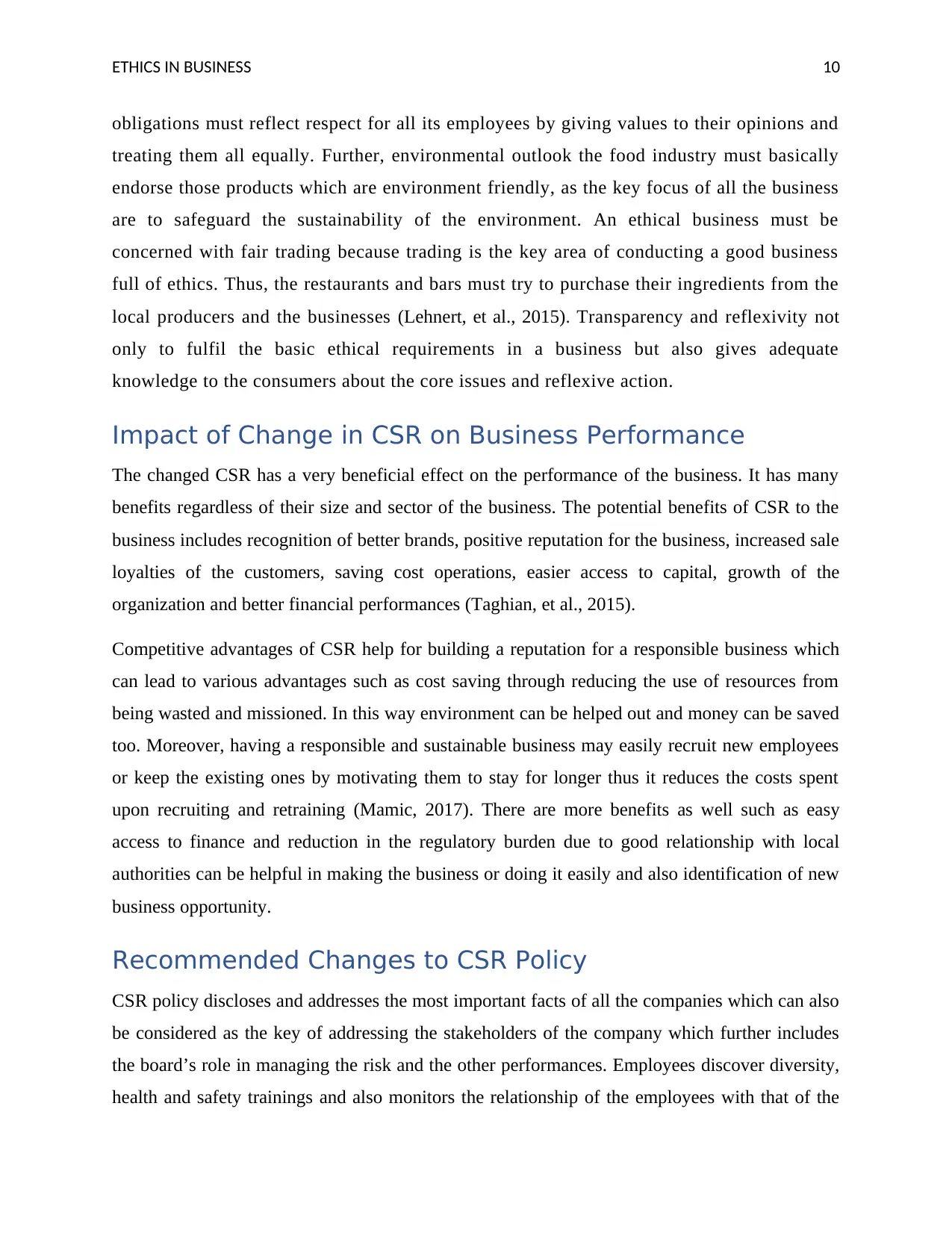
ETHICS IN BUSINESS 10
obligations must reflect respect for all its employees by giving values to their opinions and
treating them all equally. Further, environmental outlook the food industry must basically
endorse those products which are environment friendly, as the key focus of all the business
are to safeguard the sustainability of the environment. An ethical business must be
concerned with fair trading because trading is the key area of conducting a good business
full of ethics. Thus, the restaurants and bars must try to purchase their ingredients from the
local producers and the businesses (Lehnert, et al., 2015). Transparency and reflexivity not
only to fulfil the basic ethical requirements in a business but also gives adequate
knowledge to the consumers about the core issues and reflexive action.
Impact of Change in CSR on Business Performance
The changed CSR has a very beneficial effect on the performance of the business. It has many
benefits regardless of their size and sector of the business. The potential benefits of CSR to the
business includes recognition of better brands, positive reputation for the business, increased sale
loyalties of the customers, saving cost operations, easier access to capital, growth of the
organization and better financial performances (Taghian, et al., 2015).
Competitive advantages of CSR help for building a reputation for a responsible business which
can lead to various advantages such as cost saving through reducing the use of resources from
being wasted and missioned. In this way environment can be helped out and money can be saved
too. Moreover, having a responsible and sustainable business may easily recruit new employees
or keep the existing ones by motivating them to stay for longer thus it reduces the costs spent
upon recruiting and retraining (Mamic, 2017). There are more benefits as well such as easy
access to finance and reduction in the regulatory burden due to good relationship with local
authorities can be helpful in making the business or doing it easily and also identification of new
business opportunity.
Recommended Changes to CSR Policy
CSR policy discloses and addresses the most important facts of all the companies which can also
be considered as the key of addressing the stakeholders of the company which further includes
the board’s role in managing the risk and the other performances. Employees discover diversity,
health and safety trainings and also monitors the relationship of the employees with that of the
obligations must reflect respect for all its employees by giving values to their opinions and
treating them all equally. Further, environmental outlook the food industry must basically
endorse those products which are environment friendly, as the key focus of all the business
are to safeguard the sustainability of the environment. An ethical business must be
concerned with fair trading because trading is the key area of conducting a good business
full of ethics. Thus, the restaurants and bars must try to purchase their ingredients from the
local producers and the businesses (Lehnert, et al., 2015). Transparency and reflexivity not
only to fulfil the basic ethical requirements in a business but also gives adequate
knowledge to the consumers about the core issues and reflexive action.
Impact of Change in CSR on Business Performance
The changed CSR has a very beneficial effect on the performance of the business. It has many
benefits regardless of their size and sector of the business. The potential benefits of CSR to the
business includes recognition of better brands, positive reputation for the business, increased sale
loyalties of the customers, saving cost operations, easier access to capital, growth of the
organization and better financial performances (Taghian, et al., 2015).
Competitive advantages of CSR help for building a reputation for a responsible business which
can lead to various advantages such as cost saving through reducing the use of resources from
being wasted and missioned. In this way environment can be helped out and money can be saved
too. Moreover, having a responsible and sustainable business may easily recruit new employees
or keep the existing ones by motivating them to stay for longer thus it reduces the costs spent
upon recruiting and retraining (Mamic, 2017). There are more benefits as well such as easy
access to finance and reduction in the regulatory burden due to good relationship with local
authorities can be helpful in making the business or doing it easily and also identification of new
business opportunity.
Recommended Changes to CSR Policy
CSR policy discloses and addresses the most important facts of all the companies which can also
be considered as the key of addressing the stakeholders of the company which further includes
the board’s role in managing the risk and the other performances. Employees discover diversity,
health and safety trainings and also monitors the relationship of the employees with that of the
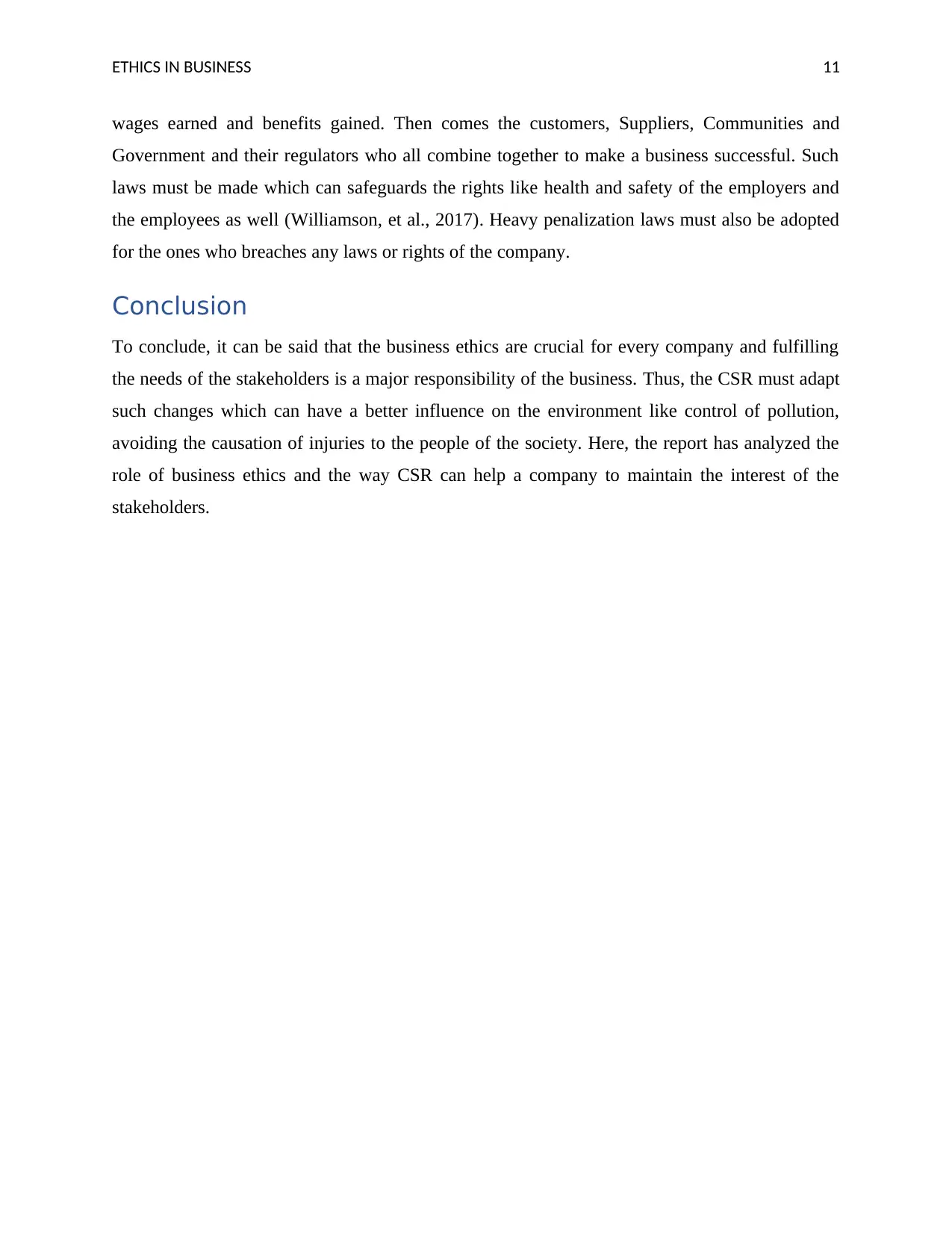
ETHICS IN BUSINESS 11
wages earned and benefits gained. Then comes the customers, Suppliers, Communities and
Government and their regulators who all combine together to make a business successful. Such
laws must be made which can safeguards the rights like health and safety of the employers and
the employees as well (Williamson, et al., 2017). Heavy penalization laws must also be adopted
for the ones who breaches any laws or rights of the company.
Conclusion
To conclude, it can be said that the business ethics are crucial for every company and fulfilling
the needs of the stakeholders is a major responsibility of the business. Thus, the CSR must adapt
such changes which can have a better influence on the environment like control of pollution,
avoiding the causation of injuries to the people of the society. Here, the report has analyzed the
role of business ethics and the way CSR can help a company to maintain the interest of the
stakeholders.
wages earned and benefits gained. Then comes the customers, Suppliers, Communities and
Government and their regulators who all combine together to make a business successful. Such
laws must be made which can safeguards the rights like health and safety of the employers and
the employees as well (Williamson, et al., 2017). Heavy penalization laws must also be adopted
for the ones who breaches any laws or rights of the company.
Conclusion
To conclude, it can be said that the business ethics are crucial for every company and fulfilling
the needs of the stakeholders is a major responsibility of the business. Thus, the CSR must adapt
such changes which can have a better influence on the environment like control of pollution,
avoiding the causation of injuries to the people of the society. Here, the report has analyzed the
role of business ethics and the way CSR can help a company to maintain the interest of the
stakeholders.
⊘ This is a preview!⊘
Do you want full access?
Subscribe today to unlock all pages.

Trusted by 1+ million students worldwide
1 out of 15
Related Documents
Your All-in-One AI-Powered Toolkit for Academic Success.
+13062052269
info@desklib.com
Available 24*7 on WhatsApp / Email
![[object Object]](/_next/static/media/star-bottom.7253800d.svg)
Unlock your academic potential
Copyright © 2020–2026 A2Z Services. All Rights Reserved. Developed and managed by ZUCOL.





